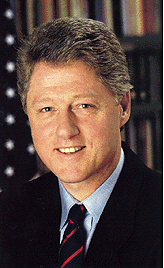
The oath for the highest office in the land was first administered
in New York City on April 30, 1789. George Washington arrived at that
Inaugural shadowed by doubts. "My movements to the chair of government
will be accompanied by feelings not unlike those of a culprit, who is
going to the place of his execution," he wrote his friend Henry Knox.
But Washington in the Presidency, as in the Revolution, was the rock on which
hope rested. He brought success. The Presidency has proved itself to be
the most remarkable political office in history.
There have been 41 men from 19 states who have been President of the
United States. Only seven of these men were born west of the
Mississippi. I am the first President
to come from Arkansas, which was admitted to the Union in 1836 as the 25th
state. Like all Chief Executives who have walked before me in this
national trust, I hope to add to its diversity and rich history.
Looking through the biographies of former Presidents, I am struck yet
again that the only constant in more than two centuries is change.
Sometimes the change was violent, as in the Civil War. The ordeal
for Abraham Lincoln in this terrible struggle was monumental, for he
became the arbiter of unsolved problems that had plagued the Union since its
inception.
"Our strife pertains to ourselves--to the passing generations of
men," he said. The same measure could be taken of the change in other
generations, though as often as not that change was less convulsive,
sometimes quiet and joyous, but still far-reaching in its
effects on the Republic.
The term of our youngest elected President, John F. Kennedy, clearly
illustrates the powerful impact of change. Events rode a roller
coaster of highs and lows. The economy took off on a long upward climb.
Offensive Soviet missiles in Cuba forced a dramatic nuclear showdown.
An assassin's bullets in Dallas turned dreams into despair.
"Men who have worked together to reach the stars are not likely
to descend together into the depths of war and desolation," Lyndon Johnson
said as he advanced Kennedy's vision to put men on the moon within
a decade. The lunar adventure was one of the world's most positive and
peaceful endeavors, and it surely helped ease strife.
The change that we face now all across the land is quite different.
The first half of this century was torn by two World Wars and a great
economic depression. In the last 40 years we have waged Cold War with
Communist powers. Now, there seems less chance of global conflict, and
the Cold War has ended. Our task is to strengthen our society at home, to
rekindle hope and opportunity for every American, and to encourage others
around the globe to understand and try our principles of justice and
freedom.
The challenge to the Presidency now is to mobilize and focus the
huge strength of the United States. Theodore Roosevelt's exuberant call
still rings clear: "Far better it is to dare mighty things, to win glorious
triumphs, even though checkered by failure, than to take rank with those
poor spirits who neither enjoy much nor suffer much, because they live in
the great twilight that knows neither victory nor defeat."
Every President that I have read about has set out to meet that
challenge. None has been perfect, none has accomplished as much as he
wanted to. But each has tried in his way to succeed, and each has left some
positive mark on history. Few have done it better than Thomas
Jefferson. He embodied the democratic age and defined the modern
Presidency. His 1801 Inaugural Address remains vital with these words for
preserving our Nation: "Let us restore ... harmony and affection without
which liberty and even life itself are but dreary things."

Copyright Information
| 
